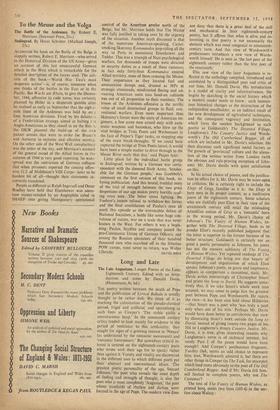To the Meuse and the Volga
Stalingrad. By Heinz Schriiter. (Michael Joseph, 25s.)
Auritouatt his book on the Battle of the Bulge is sloppily written, Robert E. Merriam—who served in the Historical Division of the US Army—gives an account of this last unsuccessful German attack in the West which is remarkable for the detailed description of the forces used. The sub- title of the book—'World -War Two's most desperate action'—is, of course, nonsense when one thinks of the battles in the East or in the Pacific. But Wacht am Rhein, to give the Decem- ber, 1944, offensive its code name, was certainly planned by Hitler as a desperate gamble after he realised as early as September that the eighty- mile front of the Ardennes was held by on:y four American divisions. Fired by his delusio-: of a Frederickian strategy aimed at halting t Anglo-Americans as they closed in on the Reit. 1, the OKW planned the build-up of the two panzer armies that were to strike for Bruss:'s and Antwerp in extreme and effective secrecy. On the other side of the West Wall complacency was the order of the day, and Merrimn's account of the general mood of the Allied forces in the autumn of 1944 is very good reporting. So wide- spread was the conviction of German collapse that when prisoners reported the coming offen- sive, G.2. of Middleton's VIII Corps—later to be hardest hit of all—thought their statements in- correctly translated.
People as different as Ralph Ingersoll and Omar Bradley have held that Eisenhower was some- how master-minded by an Anglophile cabal in SHAEF into giving Montgomery operational control of the American armies north of the Bulge; but Mr. Merriam holds that The Master was fully justified in taking over by the urgency of the situation. Another myth discussed is that of the numerous American-speaking, Camel- smoking Skorzeny Kommandos jeep-riding all the way to Paris to assassinate Eisenhower. and Tedder. This was a triumph of Nazi psychological warfare, for thousands of troops were directed to security duties as a result of these rumours; in fact only forty-four Kommandos entered Allied territory, none of them crossing the Meuse. Their importance as they located fuel and ammunition dumps and, dressed as MPs at strategic crossroads, misdirected fleeing and ad- vancing American units into head-on collision was out of all proportion to their numbers. The lesson of the Ardennes offensive is the terrific value of small determined groups in fluid, con- ventional warfare. Even more important than Skorzeny's forces were the units of American en- gineers, a few score men armed only with auto- matic weapons and bazookas, who blew up the vital bridges at Trois Ponts and Werbomont in the face of Peiper's Tiger tanks, so stopping one of the main break-throughs. 'If we could have captured the bridge at Trois Ponts intact, it would have been a simple matter to drive through to the Meuse River early that day,' said Peiper later.
Little place for the individual battle group in Stalingrad, written by a German war corre-
• spondent with the doomed Sixth Arniy. 'Intoler- able for the German people,' was Goebbels's comment on the first version of this book, re- fusing publication. And this brutal, truthful story of the trial of strength between the two great despotisms of our age makes pretty horrific read- ing even now. The bitter street fighting, the Fuehrer's insane refusal to withdraw 'his forces and the final annihilation of Paulus's men all mark this episode as the irrevocable defeat of National Socialism, a battle like some huge con- vulsion of nature, war on a scale that was never known in the West. For others it was a begin- ning. Paulus, Seydlitz and company joined the pro-Communist Union of German Officers, and among the Russian spectators of their hundred thousand men who marched off to the Siberian POW camps, most never to return, was Walter


































 Previous page
Previous page